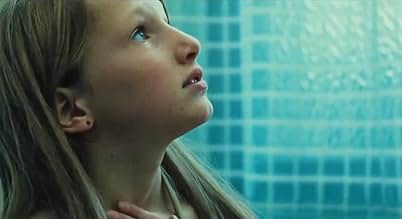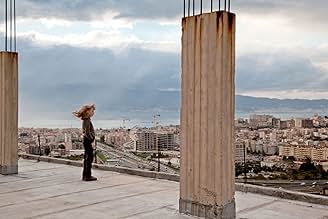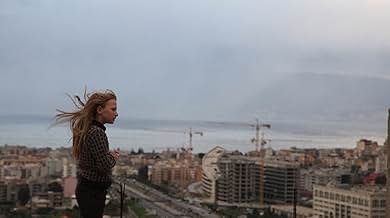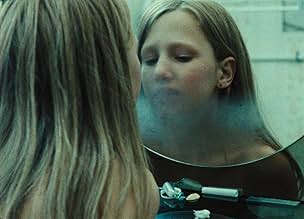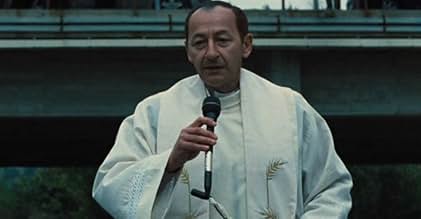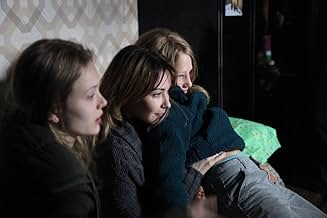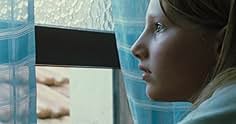CALIFICACIÓN DE IMDb
6.8/10
2.3 k
TU CALIFICACIÓN
Marta, de trece años, se ha mudado recientemente al sur de Italia con su madre y su hermana mayor y lucha por encontrar su lugar, probando sin descanso los límites de una ciudad desconocida ... Leer todoMarta, de trece años, se ha mudado recientemente al sur de Italia con su madre y su hermana mayor y lucha por encontrar su lugar, probando sin descanso los límites de una ciudad desconocida y el catecismo de la iglesia católica.Marta, de trece años, se ha mudado recientemente al sur de Italia con su madre y su hermana mayor y lucha por encontrar su lugar, probando sin descanso los límites de una ciudad desconocida y el catecismo de la iglesia católica.
- Dirección
- Guionista
- Elenco
- Premios
- 10 premios ganados y 10 nominaciones en total
Yile Yara Vianello
- Marta Ventura
- (as Yle Vianello)
Giovanni Federico
- Nino
- (as Gianni Federico)
Monia Alfieri
- Donatella
- (as Monica Alfieri)
- Dirección
- Guionista
- Todo el elenco y el equipo
- Producción, taquilla y más en IMDbPro
Opiniones destacadas
While harshly critical of the deadening effects of religious dogmatism director Alice Rohrwacher is never crudely so. She manages to inject some level of sympathy for the abusive catechism teacher as well as the careerist priest while having the most negative person be the very secular, cruelly teasing older sister of the main character. I also like how the film's dramatics never veer into histrionics. In other words, Rohrwacher has a steady, controlling hand, for me a sure sign of a good film maker. Another indication is her ability to coax an amazingly fine performance from a child actor as she does here with Yie Vianello as the traumatized yet rebellious 13 year old Marta. I hope to see more of this fine director's work as well as Vianello's subsequent film, "Sow The Wind". Give it an A minus. (Why not an A? Well, for one, I would have liked more of an examination of why Marta's dad ignores her and prefers the horrendous older sister. And for another I wanted to know why Marta's family had to move from Switzerland to Calabria which, on the trauma scale, is like going from Boulder Colorado to Greenville Mississippi.)
While I loved the nuanced and sensitive performance of Yle Vianello as Marta, I couldn't help but feel that writer/director Alice Rohrwacher's portrayal of the Catholic church in Corpo Celeste was an overdrawn caricature – that only reinforced the usual stereotypes against institutional religion. In contrast, the almost intuitive spirituality Marta possesses – of gentleness towards others, wonder at creation, curiosity about the world + its people, reverence for the divine – those elements could have been connected to broad Christian doctrines of natural revelation, love for neighbor, and the work of the Spirit, but they were not. Though the ending makes Marta's journey beyond the film feel uncertain, somehow I'm convinced (if it is possible to extrapolate) that Marta will be ultimately alright in the end. She may not find truth in the unfortunate parish she finds herself in, but she's much closer to the Truth than almost everyone else in the film. We see this in the innocent delight over the kittens that she joyfully shares with her classmates. We see this in her desire to understand the phrase from her catechism recitation "Eli, Eli, Lama Sabachthani?" which she goes around repeating to herself without knowing the meaning. This forsaken uttering of Christ on the cross ironically rings quite true in Marta's life as she is mistreated by those in church leadership, cruelly bullied by her older sister, and witnesses powerlessly the brutal killing of the kittens. In spite of all the hypocrisy and vacuity of the parish, when Marta finds herself next to a huge dusty crucifix in a forsaken little village church, she instinctively uses her hands and shirt sleeve to gently and reverently wipe the dirt off the body of Christ. Somehow, in spite of it all, a real spirituality and an intimate relationship with Christ has been apprehended.
Alice Rohrwacher cannot disappoint.
If like myself, you have seen her latter films (and don't skip the documentary La Futura) - and are wonder-ing about seeing this film, rest assured even in her debut, you shall be rewarded.
This film is a little slower or more subtle perhaps than the others. Rohrwacher has not yet put her full faith in nature, but there are gusts of winds that sort of blow the (what else) young teenage female heroine through the town she has recently moved to.
In contrast to the church's literal formula, young Marta goes on her own pilgrimage. She is a misfit both in catechism and her sister's borrowed clothing. The viewer may have to be gentle with her and this film , but ultimately there is a lot going on. Trust in her, as in all of Rohrwacher's adolescent savants. The wisdom of the naif.
I feel like this could pair well with the more grandiose "The Mission." The film is not so much about religion, though it can feel that way. To me the tale is more about abandonment.
Amazing how the director connects a famous phrase from the Bible, Christ's cry - in Greek as part of the aforementioned formula, to the town of Roghudi Vecchio. There is also the subplot of Santa (the real spirit of the small church) and Don Mario (definitely the corporate/corporeal side) - and Santa fearing his abandoning.
There are religious tropes that tantalize through-out, walking on water, loaves and fishes, the blood of innocents - but do not be led into the temptation of trope tagging, instead enjoy the beauty of doubt, and the wrestling with abandonment.
Well that, and Rohrwacher's portrayal of adolescence as somehow more knowing and more flexibly real than rigid structures of catechism and capitalism and the other isms Rohrwacher so strongly distrusts.
If like myself, you have seen her latter films (and don't skip the documentary La Futura) - and are wonder-ing about seeing this film, rest assured even in her debut, you shall be rewarded.
This film is a little slower or more subtle perhaps than the others. Rohrwacher has not yet put her full faith in nature, but there are gusts of winds that sort of blow the (what else) young teenage female heroine through the town she has recently moved to.
In contrast to the church's literal formula, young Marta goes on her own pilgrimage. She is a misfit both in catechism and her sister's borrowed clothing. The viewer may have to be gentle with her and this film , but ultimately there is a lot going on. Trust in her, as in all of Rohrwacher's adolescent savants. The wisdom of the naif.
I feel like this could pair well with the more grandiose "The Mission." The film is not so much about religion, though it can feel that way. To me the tale is more about abandonment.
Amazing how the director connects a famous phrase from the Bible, Christ's cry - in Greek as part of the aforementioned formula, to the town of Roghudi Vecchio. There is also the subplot of Santa (the real spirit of the small church) and Don Mario (definitely the corporate/corporeal side) - and Santa fearing his abandoning.
There are religious tropes that tantalize through-out, walking on water, loaves and fishes, the blood of innocents - but do not be led into the temptation of trope tagging, instead enjoy the beauty of doubt, and the wrestling with abandonment.
Well that, and Rohrwacher's portrayal of adolescence as somehow more knowing and more flexibly real than rigid structures of catechism and capitalism and the other isms Rohrwacher so strongly distrusts.
Marta(Yil Vianello) is a twelve-year-old girl preparing for her Confirmation at a church in Calabria. The waif-like kid has some serious questions about all that she is being taught to believe for her official entry into the Holy Apostolic Church.
The parish priest is seen gathering signatures in support of a local candidate for political office. So much for separation of church and state. He also has aspirations for a higher position within the Roman Church.
Meanwhile, the local children are seen at practice sessions for their special day. At sixty-five, I have little memory of my own Confirmation in the 1960s.
Vianello is a gem in the lead and pretty much carries this low-key but endearing slice of modern day Italian life.
The parish priest is seen gathering signatures in support of a local candidate for political office. So much for separation of church and state. He also has aspirations for a higher position within the Roman Church.
Meanwhile, the local children are seen at practice sessions for their special day. At sixty-five, I have little memory of my own Confirmation in the 1960s.
Vianello is a gem in the lead and pretty much carries this low-key but endearing slice of modern day Italian life.
After a slow start, I really enjoyed this one. Yle Vianello is wonderful as Marta, the earnest young girl about to go through the rite of confirmation in the Catholic Church. In a quiet way and without resorting to something like a story of priestly abuse, director Alice Rohrwacher gives us a powerful critique. She shows church leaders to be almost hopelessly far from Christ's precepts, and more interested in indoctrinating the young (in some cases with untranslated and unexplained dogma) and their own positions within the hierarchy than in real teaching. The drive from Reggio Calabria to the abandoned hill town to tussle over a crucifix seems like a perfect metaphor. I felt for Marta's coming-of-age alienation from her changing body, her mean older sister, and her crisis of faith. The subplot of the priest's assistant, a woman who finds out just how little she means in the patriarchy of the church, is also strong.
Selecciones populares
Inicia sesión para calificar y agrega a la lista de videos para obtener recomendaciones personalizadas
- How long is Corpo Celeste?Con tecnología de Alexa
Detalles
- Fecha de lanzamiento
- Países de origen
- Sitios oficiales
- Idioma
- También se conoce como
- Corpo Celeste
- Locaciones de filmación
- Productoras
- Ver más créditos de la compañía en IMDbPro
Taquilla
- Total en EE. UU. y Canadá
- USD 8,919
- Fin de semana de estreno en EE. UU. y Canadá
- USD 2,263
- 10 jun 2012
- Total a nivel mundial
- USD 347,600
- Tiempo de ejecución1 hora 39 minutos
- Color
- Mezcla de sonido
- Relación de aspecto
- 1.85 : 1
Contribuir a esta página
Sugiere una edición o agrega el contenido que falta

Principales brechas de datos
What is the German language plot outline for Corpo celeste (2011)?
Responda

